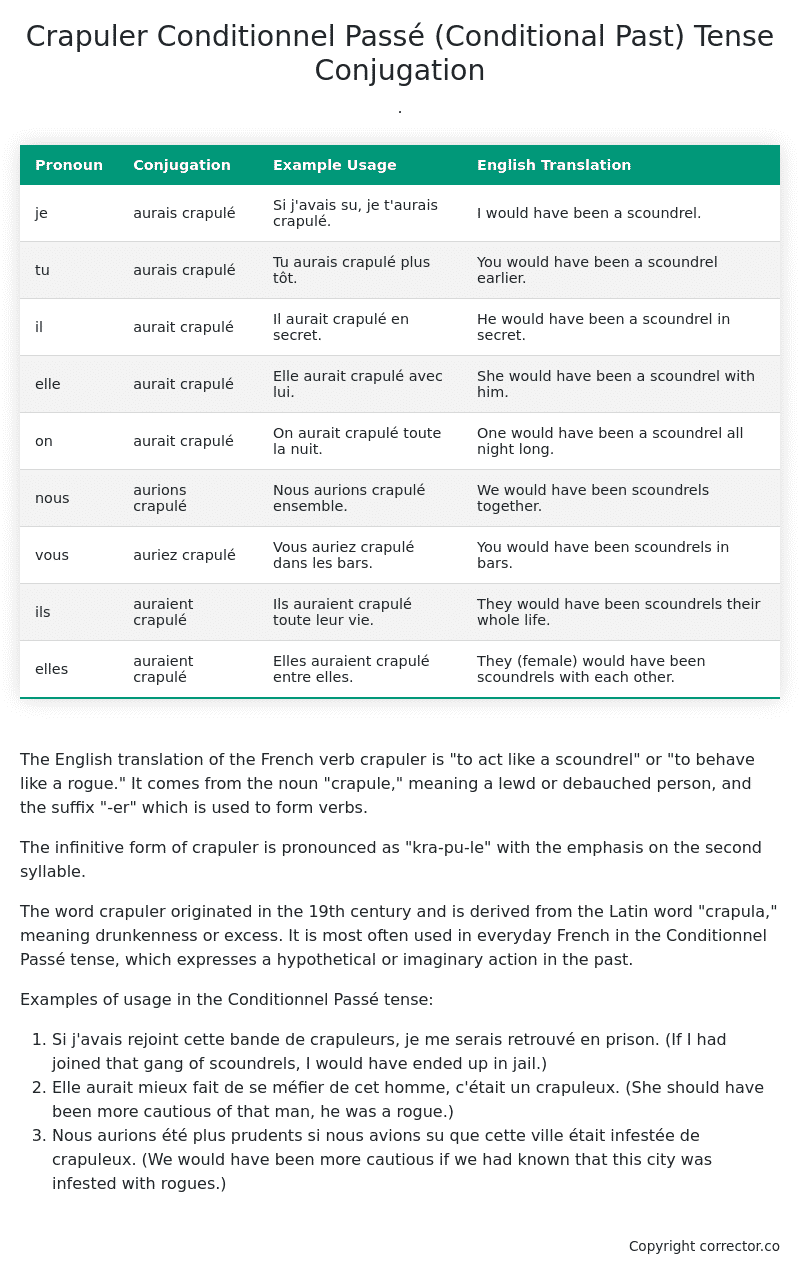Conditionnel Passé (Conditional Past) Tense Conjugation of the French Verb crapuler
Introduction to the verb crapuler
The English translation of the French verb crapuler is “to act like a scoundrel” or “to behave like a rogue.” It comes from the noun “crapule,” meaning a lewd or debauched person, and the suffix “-er” which is used to form verbs.
The infinitive form of crapuler is pronounced as “kra-pu-le” with the emphasis on the second syllable.
The word crapuler originated in the 19th century and is derived from the Latin word “crapula,” meaning drunkenness or excess. It is most often used in everyday French in the Conditionnel Passé tense, which expresses a hypothetical or imaginary action in the past.
Examples of usage in the Conditionnel Passé tense:
- Si j’avais rejoint cette bande de crapuleurs, je me serais retrouvé en prison. (If I had joined that gang of scoundrels, I would have ended up in jail.)
- Elle aurait mieux fait de se méfier de cet homme, c’était un crapuleux. (She should have been more cautious of that man, he was a rogue.)
- Nous aurions été plus prudents si nous avions su que cette ville était infestée de crapuleux. (We would have been more cautious if we had known that this city was infested with rogues.)
Table of the Conditionnel Passé (Conditional Past) Tense Conjugation of crapuler
.
| Pronoun | Conjugation | Example Usage | English Translation |
|---|---|---|---|
| je | aurais crapulé | Si j’avais su, je t’aurais crapulé. | I would have been a scoundrel. |
| tu | aurais crapulé | Tu aurais crapulé plus tôt. | You would have been a scoundrel earlier. |
| il | aurait crapulé | Il aurait crapulé en secret. | He would have been a scoundrel in secret. |
| elle | aurait crapulé | Elle aurait crapulé avec lui. | She would have been a scoundrel with him. |
| on | aurait crapulé | On aurait crapulé toute la nuit. | One would have been a scoundrel all night long. |
| nous | aurions crapulé | Nous aurions crapulé ensemble. | We would have been scoundrels together. |
| vous | auriez crapulé | Vous auriez crapulé dans les bars. | You would have been scoundrels in bars. |
| ils | auraient crapulé | Ils auraient crapulé toute leur vie. | They would have been scoundrels their whole life. |
| elles | auraient crapulé | Elles auraient crapulé entre elles. | They (female) would have been scoundrels with each other. |
Other Conjugations for Crapuler.
Le Present (Present Tense) Conjugation of the French Verb crapuler
Imparfait (Imperfect) Tense Conjugation of the French Verb crapuler
Passé Simple (Simple Past) Tense Conjugation of the French Verb crapuler
Passé Composé (Present Perfect) Tense Conjugation of the French Verb crapuler
Futur Simple (Simple Future) Tense Conjugation of the French Verb crapuler
Futur Proche (Near Future) Tense Conjugation of the French Verb crapuler
Plus-que-parfait (Pluperfect) Tense Conjugation of the French Verb crapuler
Passé Antérieur (Past Anterior) Tense Conjugation of the French Verb crapuler
Futur Antérieur (Future Anterior) Tense Conjugation of the French Verb crapuler
Subjonctif Présent (Subjunctive Present) Tense Conjugation of the French Verb crapuler
Subjonctif Passé (Subjunctive Past) Tense Conjugation of the French Verb crapuler
Subjonctif Imparfait (Subjunctive Imperfect) Tense Conjugation of the French Verb crapuler
Subjonctif Plus-que-parfait (Subjunctive Pluperfect) Tense Conjugation of the French Verb crapuler
Conditionnel Présent (Conditional Present) Tense Conjugation of the French Verb crapuler
Conditionnel Passé (Conditional Past) Tense Conjugation of the French Verb crapuler (this article)
L’impératif Présent (Imperative Present) Tense Conjugation of the French Verb crapuler
L’infinitif Présent (Infinitive Present) Tense Conjugation of the French Verb crapuler
Struggling with French verbs or the language in general? Why not use our free French Grammar Checker – no registration required!
Get a FREE Download Study Sheet of this Conjugation 🔥
Simply right click the image below, click “save image” and get your free reference for the crapuler Conditionnel Passé tense conjugation!

Crapuler – About the French Conditionnel Passé (Conditional Past) Tense
Formation
Common Everyday Usage Patterns
Expressing Unreal Past Scenarios
Polite Requests or Suggestions
Expressing Doubt or Uncertainty
Interactions with Other Tenses
Conditional Present
Indicative Past Tenses
Conditional Future
Summary
Want More?
I hope you enjoyed this article on the verb crapuler. Still in a learning mood? Check out another TOTALLY random French verb conjugation!


